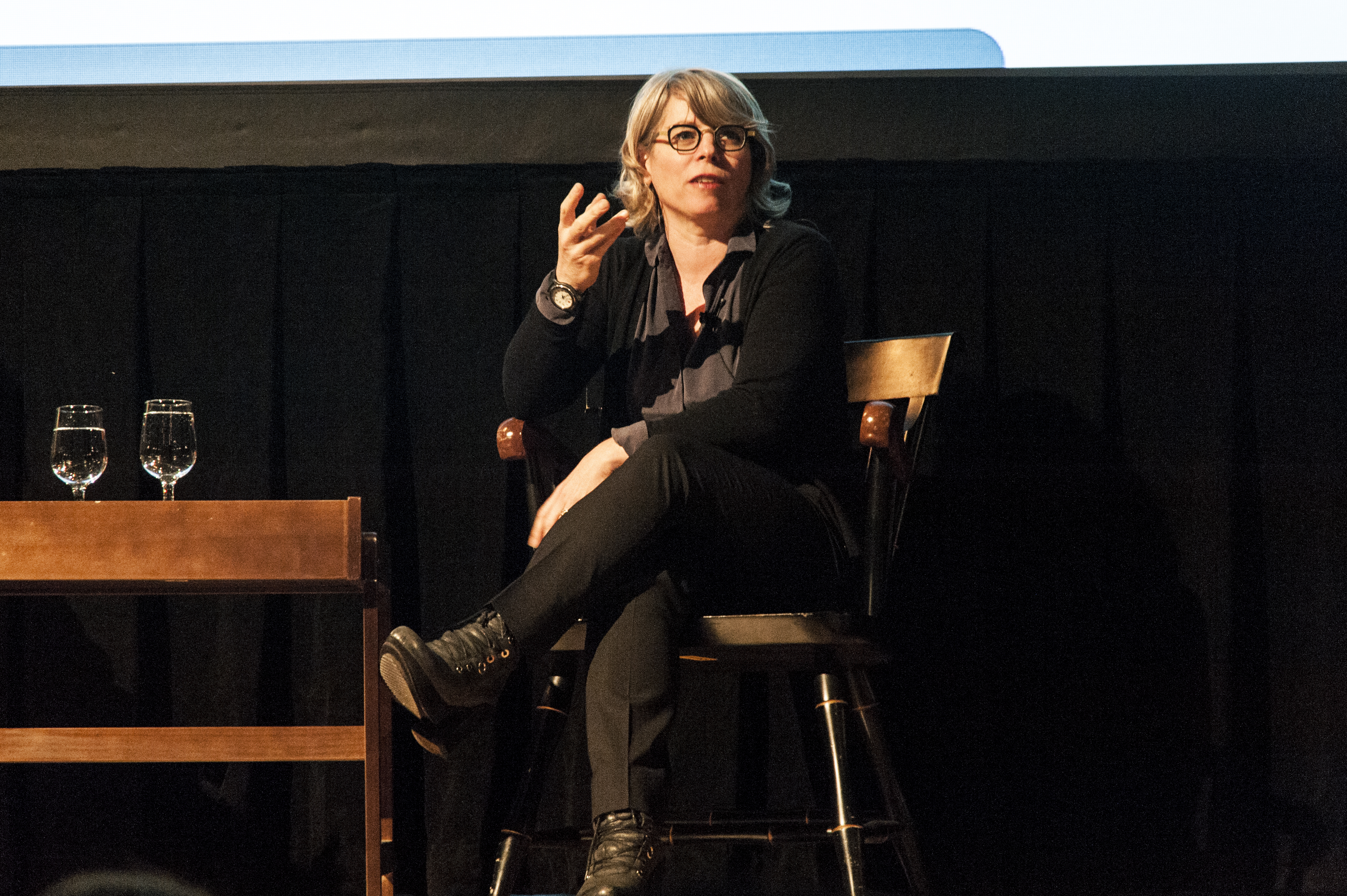By JULIA HABLAK, staff writer
This year’s Emily Balch speaker Jill Lepore came to campus on Thursday, Oct. 26 for a highly anticipated Lecture and Q&A session, hosted by English and Emily Balch Seminar professor Matthew Ruben.
The Emily Balch Speaker Series takes place each year in conjunction with the Emily Balch Seminars for first-year writing at Bryn Mawr. Past featured speakers include award-winning novelist and essayist Zadie Smith, novelist and MacArthur “Genius” Fellow Karen Russell, and graphic novelist Alison Bechdel.
Ruben’s introduction was an impressive list of achievements: Lepore is the David Woods Kemper ‘41 Professor of American History at Harvard University; she has published a dozen books, including “The Secret History of Wonder Woman” (2014), “Book of Ages: The Life and Opinions of Jane Franklin” (2013), and her newest book, “Joe Gould’s Teeth” (2016); and Lepore is also a contributing staff writer for the New Yorker since 2005.
Ruben kicked off the Q&A with a question that plagues college first-years: how did you end up doing what you’re doing now? Lepore, laughing, called herself a poster child for the rebel. Lacking the money to fund her education, Lepore wasn’t always sure that college was in her future. But she had always been an athlete and ended up attending Tufts University on an ROTC scholarship. Today she attributes her belief in public service partially to this childhood opportunity.
Lepore began college as a math major, but was in for a blast from the past. Her mother sent her a letter she had written when she was 14, one of those letters to your future self. Lepore recalls how mean she was at 14, yelling at her future self to do what she loved.
Inspired by her younger self, Lepore made some drastic changes. She left ROTC, dropped field hockey, and became an English major. But without her ROTC scholarship, she had no way to fund further education.
In need of a job, she became a secretary at Harvard University and, in a “Good Will Hunting” twist of events, began sneaking into history classes. She received no credit for the classes; she was not enrolled, but that did not affect her drive to learn.
It was after winning an elaborate award for her secretarial work that Lepore experienced another wakeup call—she didn’t want to be a secretary. She once again changed her plans, went to graduate school and, for the first time, started to show people her writing.
Satisfied with unraveling her journey, Ruben turned the Q&A to more studious topics. He cited some of Lepore’s work, which first-year students have been reading and discussing in their Emily Balch seminars.
One of the things Ruben heard students say about Lepore’s writing is, “This is a great story. Where’s the argument?” It begs the question: is Lepore trying to say anything in her writing?
As Lepore explained it, she does not want to just argue something; she wants to tell a story that people care to read. What she tries to do, she said, is embed her argument in her stories, slyly convincing her readers of something without their realizing it.
So how does Lepore approach creating this subtle argument? In her paper “How to Write a Paper for This Class,” Lepore does not seem to sympathize with the idea that you should form an argument first. Rather, she advises, start with a question.
To illustrate her point, Lepore leaped into a hilarious antidote explaining her article “Baby Food” about the history of the breast pump. “I guess I can talk about this at a women’s college,” Lepore quipped, evoking laughter from the audience.
This article, like her others, started with a question. At a conference, Lepore stood in the bathroom with seven other women, “lined up like cows,” using breast pumps. The bathroom was dirty, the breast pumps were whirring, and the women were having a conversation over the noise. Lepore’s wanted to know, quite naturally, “how did this happen?” After some research, she found the answer. That, according to Lepore, is how you get an argument.
Ruben turned the conversation to one of Lepore’s books, “Book of Ages: The Life and Opinions of Jane Franklin,” about a woman whose life is mostly lost to history. He inquired about Lepore’s challenges in writing this book.
Lepore began to describe this dilemma of the “asymmetry of history,” where historical primary sources are largely accounts told by men, because women and other minority groups were not educated nor allowed to learn how to write until about the 19th century. This “impoverished past” makes it difficult to deduce anything from history and solve problems. The solution, Lepore said, is to either look harder or to work with what you have.
Here the Q&A moved to student questions. Lepore answered a question about working for the New Yorker and “living in constant fear of being fired.” However, she said she enjoys feeling “useful” and being able to address a wider audience than she can with her books alone.
She also enjoyed the diversity of her writing for the New Yorker. She alluded to the sexism in the journalism industry, saying that anywhere else she would be asked to write exclusively angry, feminist articles. The New Yorker, as she puts it, sees her wings, and wants her to spread them and fly.
As general advice, Lepore brought up two things that she tries to do and work for her. First, “keep an eye on people you admire,” and second, “learn from good people.” Students met all of her intelligence, experience, and laugh out loud humor with great applause.
Photo by Abby Webster
